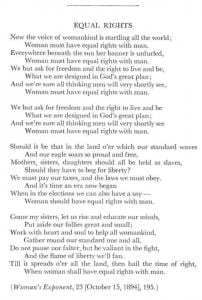I grew up with a “less-active” father. In Mormon parlance, this means my dad attended church regularly but only one of three of our meetings (Sacrament) and he didn’t pay his tithing. In Mormon terms, this made him a “less-righteous” priesthood holder.
Because I’ve promised my family I’d limit how I talk about them, I’ll just say this. My father is a very honest, principled man. But I didn’t see him as such because he didn’t “exercise his priesthood.”
Most of my childhood was spent in overcompensating for not “having a worthy priesthood holder in the home.” I became hyper-vigilant in my orthodoxy. I had a lot to make up for. If dad couldn’t bring us to the Celestial Kingdom, I was going to.
Make no mistake, my dad wasn’t unworthy of anything, he just had different views. Still, I viewed him through the lens of complete fidelity to the institutional Latter-day Saint movement which reinforced, over and over, that dad wasn’t quite part of our family. Not our eternal one anyway.
We just understood that in the next life, dad would be somewhere else. I actually can’t remember a time not thinking this and this definitely played into the disrespect I felt for him, which eventually turned into resentment when I married in the temple and he stayed outside.

I’m not alone. One of my best friends grew up with a father that drank alcohol, which made him an “unworthy” priesthood holder. As she reconciled the same conflict I had, she developed a daily habit of “sinning smally,” so that she too wouldn’t go to the Celestial Kingdom (Mormon’s highest status in heaven). She said it this way:
“I loved my dad more than anything. I couldn’t bear the thought of not being with him when he died. I knew he struggled with alcohol and tried for years to kick the habit. But he couldn’t, and so I decided I would sin every day, on purpose, so I could go wherever he goes when we die. I couldn’t let my dad, who was a deeply good man, be alone.”
These sentiments are far from rare. (Don’t even get me started on divorced and single parents).
There’s the story of another friend with a “less-active”father in Wyoming whose Bishop of the ward took her mother and children “under his wing.” He eventually decided it was his “priesthood duty” to marry the mother in the next life so that she could go to the Celestial kingdom. Soon after, he began teaching the family the doctrine of plural marriage. My friend grew up as a faithful, active Latter-day Saint, sitting at the feet of Ogden Kraut and learning about “the higher law” (polygamy). When the Bishop began taking on actual plural wives, LDS church general authority, Mark E. Petersen was called in and the Bishop was excommunicated. My friend spent her adolescence and early adulthood, deeply confused about Mormon theology.
Today I heard a story from a friend who has changed his literal belief of Mormonism’s truth claims. He has resigned from the church, but is supportive of his active wife and children. Just recently their Bishop contacted the family and offered to give the children a Father’s Blessing for the new school year (it is a tradition for faithful Mormons to receive a blessing from their father before school starts. I never got one, unless my grandfather gave us one). My friend mentioned that it was a kind gesture.
I disagree. I think it’s a pernicious one. It’s a suggestion that the father is derelict in his duty as a parent. The subtle judgment and arrogance of proxy spiritual parenting plants a wedge between parent and child. I know this on a personal level. I felt it every time someone else’s father put their hands on my head. I was reminded that my dad must love wickedness a little more than he loved me.
I’m certain the Bishop means well. But intent doesn’t account for impact. The Bishop in Wyoming meant well too. His heart was converted to Mormonism and his brain was trying to make sense of the gaps in the theology.
The gap in the theology is this:
A Gospel that values families should be advocating for ways that unite family members together, regardless of where they are at in their faith journey. Unfortunately, current LDS practices too often put family members at odds when someone doesn’t quite fit the mold. This is wrong. It is harmful. It does damage. It separates families, even if the families remain under the same roof.
The practice of being a proxy for a less-righteous priesthood holder might seem innocuous, but I’ve witnessed it performed to its logical end. In the FLDS, church leader Warren Jeffs practiced the doctrine of family separation. The idea was the same as everything mentioned here, it’s just that Jeffs took it to a new level. But he wasn’t without doctrinal basis.
Rather than just allowing a “more righteous” priesthood holder to perform ordinances for families like many LDS families do, Jeffs started reassigning entire families to new fathers. It is, without question, the most harmful thing Jeffs has done to the community. The ripple effects are so vast and wide, it would take a book to articulate it. You can read more about it here.
Jeffs didn’t make this up. The Bishop in Wyoming didn’t make this up. There is doctrinal precedent for it.
George D. Watts reports Brigham Young’s sermon in October 1861:
“The second way in which a wife can be separated from her husband while he continues to be faithful to his God and his priesthood I have not revealed except to a few persons in this church, and a few have received it from Joseph the Prophet as well as myself. If a woman can find a man holding the keys of the priesthood with higher power and authority than her husband, and he is disposed to take her, he can do so, otherwise she has got to remain where she is. In either of these ways of separation you can discover there is no need for a bill of divorcement.”
Whether or not this idea is widespread in church discourse is irrelevant because it is undeniable that the cultural remnants remain and still permeate LDS thinking. As a child of a parent who was deemed “less-valiant” I can absolutely attest that it changed the way I viewed my father. I wish it didn’t, but it did. How could it not, when I, fervent believer in the Celestial Kingdom as I was, only wanted to please God? I had to choose between my earthly father and my Heavenly one. No child should feel this way.
On a related note, I’ve often wondered why so many people with a Mormon background advocate for family separations at the border. Doesn’t our doctrine demand that we value keeping families together? Isn’t that the entire point of our ordinances? And yet, too many Mormons have a very lazy attitude towards the horrific family separations at the border. Within the framework of priesthood and authority, it might gives us some clues as to why. It’s almost as if we want to be seen as valuing families, but our theology and practices don’t back that up. What good is a core doctrine when the practices around it actively undermine it?
My argument here is this: If we only have a handful of quotes from church leaders advocating for Higher, Holy Priesthood and loads of quotes about the importance of families, why are we prioritizing a harmful interpretation over a kinder, more inclusive one?
I want a theology that would have helped me develop a closer, trusting relationship with my parents. Instead I got a theology that made me deeply suspicious of not only my own dad, but other good men. I equated “good” with the priesthood and attributed any character flaw of my father to his unrighteousness. This also made me believe that having the priesthood made you good. (Spoiler alert: it doesn’t).
Every parent- both mother and father are worthy to participate in important rites in a child’s life. Otherwise, what good are families? Any doctrine, policy, or belief that advocates for or allows families to be separated on earth or in heaven, even if it’s just in our hearts, is a doctrine we should reject completely. The doctrine, culture, and theology should continue to “reveal” ways that help all members of the family. Not just the ones loyal to the institution.











